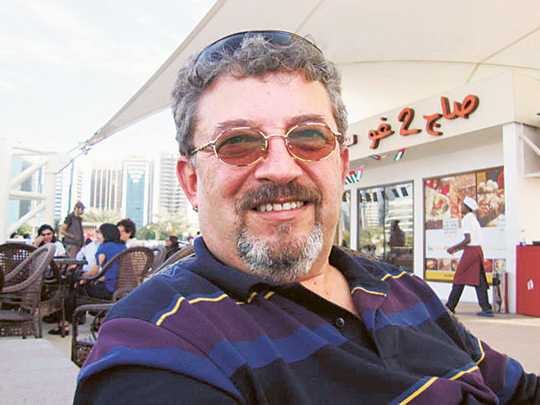
Ali Kemal Senan writes novels in Turkish, depicting Anatolian civilisation, history and mythology. His Mediterranean upbringing has shaped his creative pursuit, prompting him to complete 16 Turkish literary delights (which have been translated into English, German, and Russian). Senan grew up in Halicarnassus, modern-day Bodrum, and studied HR management at Dokuz Eylul University in Izmir after completing a course in social psychology. He had a short stint as a commercial staff and later served as a government representative for culture and tourism.
In the UAE, Senan founded www.bookslore.com — the e-book website that serves as an exclusive portal to access his books and other literary works.
Historical events, intriguing tales, unknown stories and unreported exploits now fill the pages of Senan's tomes. The prolific author gives away answers to mysteries and legends, immortal affairs, forgotten milestones, cultural clashes, rousing incidents and the romance that colours people's lives and the world.
Recently he signed his last novel, Phaselis in Nadwat Al Thkafa wa Alolom, in Dubai. Excerpts from an interview:
You said you put your ‘soul' in your novel. What do you mean by that?
I'm a creative writer. I use the historical setting juxtaposed with the experience I have had. That becomes the primary book design and then I decorate it with my dreams — those deeper imaginations I can easily "see" in my mind. When I start to write, I feel myself inside the story, even if it is the ancient past. I can imagine what's happening in 1500BC. Yes, I can easily live the hustle and bustle of that time in a particular place. I have gleaned that patience, deep understanding and knowledge from my reading. Furthermore, I write in the place where my novel unfolds. The readers can see all the techniques and details in the latest book, Dream & Write, which K.P. Mariscal is co-writing and editing these days.
In ‘Phaselis', are you writing about social psychology?
I took a page from history about an old civilisation. The historical documents I have access to only give me superficial information. I know that everybody wants to peep into lifestyles in old civilisations; everyone seems to be excited about how ancient people managed their lives or things such as slavery, monarchy and love. I gathered enough data and used it in Phaselis. When I wrote the novel, I explained more about people's psychology.
Why do you use mythology and history in your novels?
There are many reasons. Some older writers influenced me. Such as Cevat Shakir Kabaagachli, popularly known as the Halicarnassus Fisherman. There are enough reasons to know about the past. I need to combine a few elements to make an interesting story. Besides, we Turks know little about our ancient past. It is the foreigners who seem to know more about our history and I feel I would be doing Turkey a disservice if I didn't do something about the situation. So I write about our past, about the mythology that Greece claims to be its. I tell you, civilisation started in the east, not the west.
What is your relation with the Mediterranean?
When I decided to write about history and mythology, I did not think of going elsewhere. The Mediterranean is huge and everything I need to know seems to originate from there. I have the Mediterranean salt water in my veins.
What role does Anatolia play in your novels?
I'm an Anatolian in the Mediterranean. I have come from an age-old tradition that belongs to modern-day Turkey. To find enough material for my novels, I need to live and breathe in the same atmosphere where I want my novel to take shape. The bonus is that Anatolia rests in the region that boasts many ancient civilisations.
Are there any misunderstandings in Greek history?
Of course, too many. There are too many misconceptions, mistakes and false claims. But I leave that to historians. Our Islamic heritage did not permit us to give too much attention to statues and pre-Islamic times. But we should have treasured our history. The Ottoman sultans did not give priority to the past. Take Homer, Hygeia, Herodotus, Sappho, even the origin of the Olympics. There are six big Olympus mountains in Anatolia, including one at which, archaeological findings suggest, the Olympic Games were held. The Roman emperors did not take an interest in the rocky places in Greece. You can see that the best Roman influence still survives in Turkey.
Are you publishing on your own?
Yes. My editor is working to have a publishing house and it is only right that he should start with my novels.
What is your problem with publishing houses?
Terms and conditions. The publishing houses seem to be more concerned about the business than infotainment and social order.
What are your next books?
Historical and mythological books of the East. Ka, Arzawa, Pegasus, Amazon, Dream and Write and The Princess of Gemile.
Are you writing a new novel about Dubai or the UAE?
Yes. I have written two books — Insufferables and Dubai — which are ready for translation into English and Arabic. Fiction. They are about social life in the UAE, business, love, adventures for films.
Shakir Noori is a senior editor residing in Dubai and Paris.


